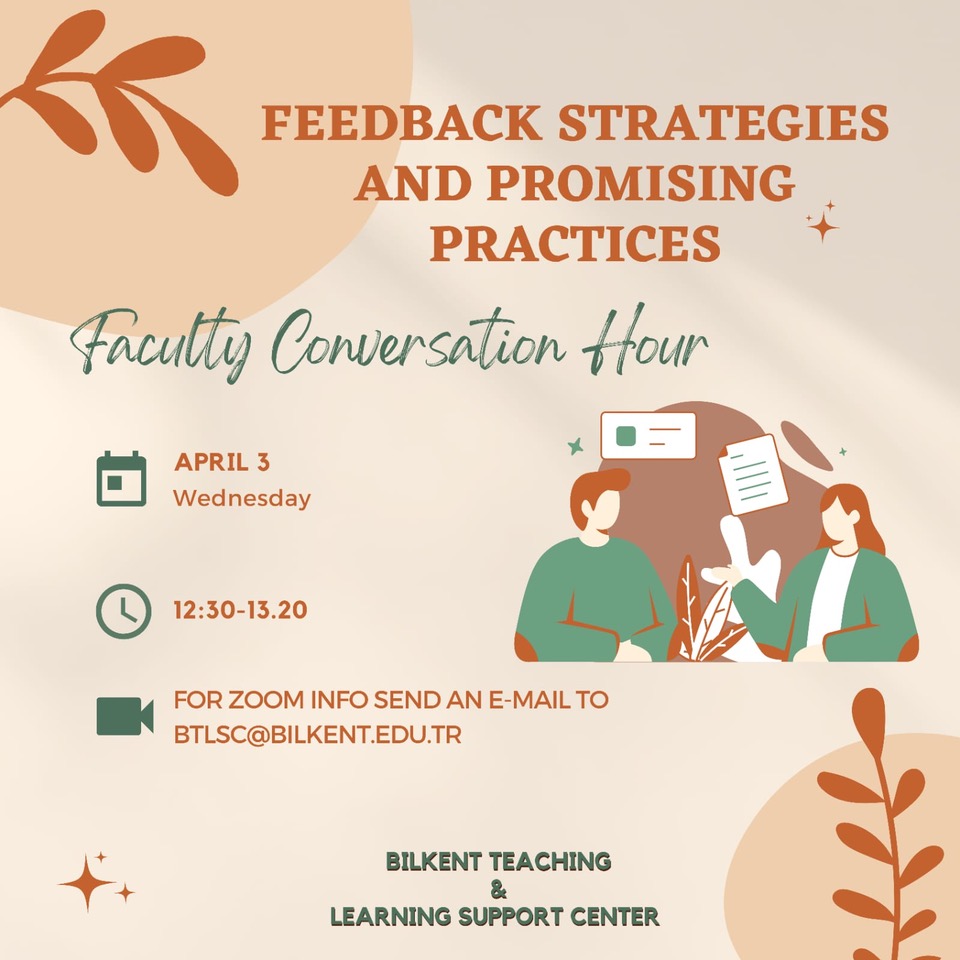Best Practices in Teaching & Learning I
The seminar will take place on Tuesday, September 30, at 12:30 p.m. in the Library Art Gallery.
We invite you to the first event of the semester, “Best Practices in Teaching & Learning I.”
The session will feature two of the 2025 Bilkent Distinguished Teaching Award recipients as speakers.
We look forward to your participation in this opening event of the semester.
Speakers:
Firdevs Ulus, Faculty of Engineering, Department of Industrial Engineering
Miri Besken, Faculty of Economics, Administrative, and Social Sciences, Department of Psychology
AI in Education: From Stochastic Parrots to Synergistic Partners
Date and Time: Friday, April 18th, from 11:00-12:30 at C Block Amphitheatre
We invite you to the forthcoming “AI in Education: From Stochastic Parrots to Synergistic Partners” seminar by Prof. Dr. Mutlu Çukurova. The seminar is scheduled for the 18th of April, from 11:00-12:30 at C Block Amphitheatre. We recommend bringing a laptop or tablet for the last part of the seminar.
Abstract: This talk explores the potential of artificial intelligence (AI) in education, focusing on its multifaceted conceptualisations as tools, cognitive models, and agents of human-AI hybrid intelligence. Highlighting recent advancements in generative AI, the talk critically examines its promise and limitations in supporting both student learning and teacher practices. While AI presents some opportunities for task automation and learning-enhancement, it also raises critical concerns regarding human agency, ethical considerations, and systemic inequalities in education. Drawing on decades of research in AI and education, the talk emphasises the need to move beyond narrow applications of AI for productivity gains. Instead, it advocates for AI systems that augment human competence, foster lifelong learning skills, and align with broader societal values. Using examples from his own work on multimodal learning analytics and human-centred AI, Prof. Cukurova underscores the importance of designing educational systems that embed AI within intentional, evidence-informed, and human-centred pedagogical frameworks.
Speaker: Mutlu Cukurova is a Professor of Learning and Artificial Intelligence at University College London. Prof. Cukurova investigates human-AI complementarity in education, aiming to address the pressing socio-educational challenge of preparing people for a future with AI systems that will require a great deal more than the routine cognitive skills currently prized by many education systems and traditional approaches to automation with AI. He directs the UCLAIT team and leads the Design and Use of AI in Education course at UCL. In addition, he is engaged in policy-making activities as an external expert (including UNESCO, IAEA, and EU external expert groups and co-authored the UNESCO AI Competency Framework for Teachers). He was the programme co-chair of the International Conference of AI in Education in 2020 and CSEDU in 2022, is part of UCL’s Grand Challenges on Transformative Technologies group, named in Stanford’s Top 2% Scientists List, Editor-in-Chief of the British Journal of Educational Technology and Associate Editor of the International Journal of Child-Computer Interaction.
Please see seminar’s video via the link.
Best Practices in Teaching & Learning II: How to Teach Skills in an Uncertain World: Preparing Students for the Future
Date and Time: Tuesday, April 15th, at 12:30 p.m. via Zoom
We invite you to the forthcoming “Best Practices in Teaching & Learning II: How to Teach Skills in an Uncertain World: Preparing Students for the Future” seminar. It will be held via Zoom on Tuesday, April 15th, at 12:30 p.m. Dr. Yiğit Acar, Bilkent Distinguished Teaching Award Winner of 2024 will be our speaker.
Abstract:
Teaching tacit knowledge, particularly in contexts that require divergent thinking skills—such as design thinking—is especially challenging. Beyond the inherent difficulty of teaching a skill that is difficult to codify, the ever-evolving professional and technological landscape continues to add new layers of complexity. With the shifting conditions of the global job market and the rise of emerging technologies that challenge all forms of intellectual work, it is essential to reflect on our teaching practices—both in terms of content and delivery methods. Through examples and shared experiences from design studios, this talk will explore methods and strategies for teaching skills in an increasingly uncertain world.
About the speaker:
Dr. Yiğit Acar, a Ph.D. graduate from Middle East Technical University, is a scholar specializing in digital humanities, architecture, and urbanism. His research interests encompass urban design, theory, data mining, artificial intelligence, and visualization. He has a number of entries and prizes in architectural and urban design competitions. Currently a Lecturer at Bilkent University, he teaches architectural design studios, digital media, drawing, presentation techniques, and history courses. In 2024, he was awarded the Distinguished Teaching Award at Bilkent University in recognition of his contributions to education.
Please see seminar’s video via the link.
(Please ask for the password: btlsc@bilkent.edu.tr)
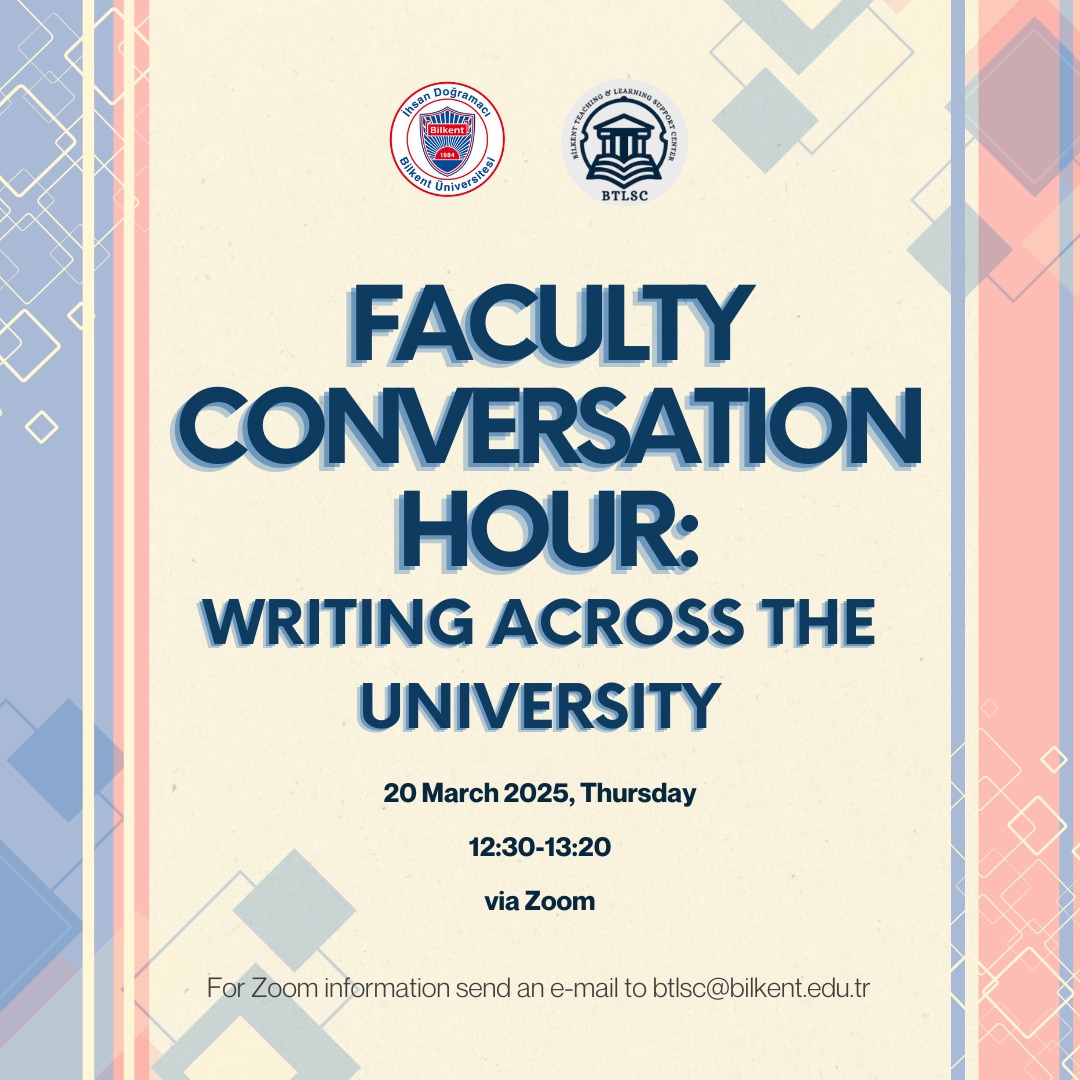 BTLSC Faculty Conversation Hour: Writing Across the University
BTLSC Faculty Conversation Hour: Writing Across the University
Date and Time: November 18th, at 12:30 p.m. via Zoom
The conversation hour is scheduled for 20 March 2025, Thursday, at 12:30 via Zoom.
After quickly reviewing the writing tasks to be used in the classes, we will discuss our ideas and strategies.
Join us to share experiences and questions.
Trauma-Informed Teaching
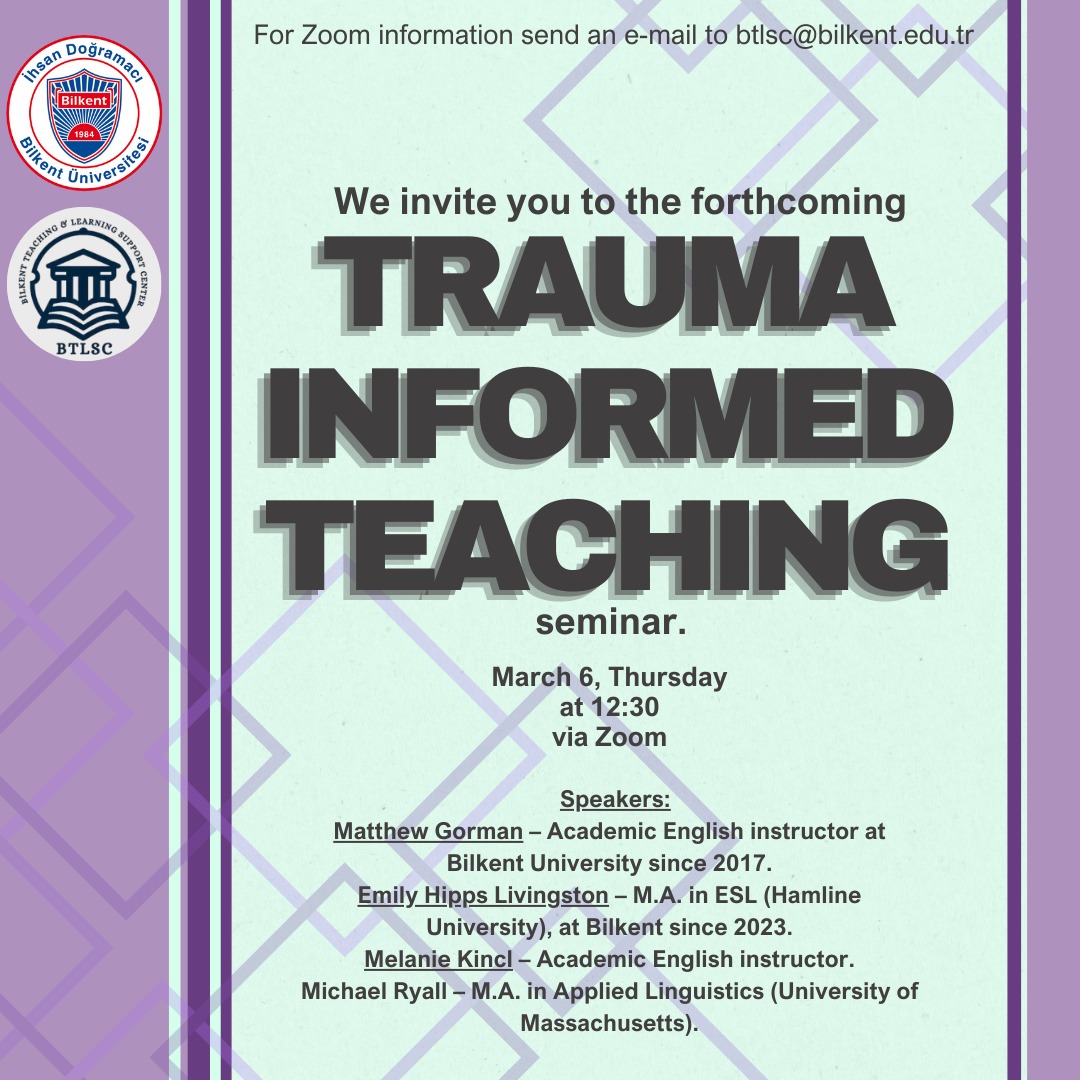 Date and Time: 6th of March, 2025, Thursday, at 12:30 via Zoom.
Date and Time: 6th of March, 2025, Thursday, at 12:30 via Zoom.
We invite you to the forthcoming “Trauma Informed Teaching” seminar. The seminar is scheduled for the 6th of March, Thursday, at 12:30 via Zoom.
Abstract: This interactive presentation introduces trauma-informed teaching principles and best practices to help instructors better support students who have experienced trauma—while also enhancing learning for all students. After a brief overview of key concepts, participants will engage in breakout sessions to explore practical applications in the classroom.
Speakers:
Matthew Gorman has taught at Bilkent University’s Academic English Program since 2017. He holds an M.A. in TESOL and B.A. in Linguistics.
Emily Hipps Livingston holds an M.A. in ESL from Hamline University and has been with Bilkent since 2023.
Melanie Kincl teaches in the academic English program. She is especially interested in accommodating learners who face more than average challenges in higher education.
Michael Ryall has an M.A. in Applied Linguistics from the University of Massachusetts. He is also interested in wellness, meditation, and creative writing.
Please see seminar’s video via the link.
AI in Education: From Stochastic Parrots to Synergistic Partners
Date and Time: February 21st, at 11:00 a.m. at A 130
We invite you to the forthcoming “AI in Education: From Stochastic Parrots to Synergistic Partners” seminar by Prof. Dr. Mutlu Çukurova. The seminar is scheduled for the 21st of February, from 11:00-12:30 at A 130. We recommend bringing a laptop or tablet for the last part of the seminar.
Abstract: This talk explores the potential of artificial intelligence (AI) in education, focusing on its multifaceted conceptualisations as tools, cognitive models, and agents of human-AI hybrid intelligence. Highlighting recent advancements in generative AI, the talk critically examines its promise and limitations in supporting both student learning and teacher practices. While AI presents some opportunities for task automation and learning-enhancement, it also raises critical concerns regarding human agency, ethical considerations, and systemic inequalities in education. Drawing on decades of research in AI and education, the talk emphasises the need to move beyond narrow applications of AI for productivity gains. Instead, it advocates for AI systems that augment human competence, foster lifelong learning skills, and align with broader societal values. Using examples from his own work on multimodal learning analytics and human-centred AI, Prof. Cukurova underscores the importance of designing educational systems that embed AI within intentional, evidence-informed, and human-centred pedagogical frameworks.
Speaker: Mutlu Cukurova is a Professor of Learning and Artificial Intelligence at University College London. Prof. Cukurova investigates human-AI complementarity in education, aiming to address the pressing socio-educational challenge of preparing people for a future with AI systems that will require a great deal more than the routine cognitive skills currently prized by many education systems and traditional approaches to automation with AI. He directs the UCLAIT team and leads the Design and Use of AI in Education course at UCL. In addition, he is engaged in policy-making activities as an external expert (including UNESCO, IAEA, and EU external expert groups and co-authored the UNESCO AI Competency Framework for Teachers). He was the programme co-chair of the International Conference of AI in Education in 2020 and CSEDU in 2022, is part of UCL’s Grand Challenges on Transformative Technologies group, named in Stanford’s Top 2% Scientists List, Editor-in-Chief of the British Journal of Educational Technology and Associate Editor of the International Journal of Child-Computer Interaction.
“Best Practices in Teaching & Learning I” Seminar
Date and Time: November 18th, at 12:30 p.m. via Zoom
“Best Practices in Teaching & Learning I” seminar. It was held via Zoom on Monday, November 18th, at 12:30 p.m. Two Bilkent Distinguished Teaching Award Winners of 2024 were our speakers.
Ali Javili, Faculty of Engineering, Department of Mechanical Engineering
Burçin Kısacıkoğlu, Faculty of Economics, Administrative, and Social Sciences, Department of Economics
Please see seminar’s video via the Zoom link.
(Please ask for the password: btlsc@bilkent.edu.tr)
Workshop
Date and Time: October 1th, at 12:30 p.m.
The BTLSC and BETS invited you to a face-to-face workshop (1 October 12:30-13:20) on using Moodle for both new instructors and those who wanted to develop their knowledge and skills.
If you wanted to attend, you were asked to sign up using the following Google survey (https://forms.gle/7448ca78zTS5kGVB7) by the 27th of September, 14:00. Further information about the place of the workshop was provided.
Before the session, participants were asked to sign up for an account and the “Moodle@Bilkent” self-access course on the genmoodle with their @bilkent email: https://gen3moodle.bilkent.edu.tr/course/view.php?id=200. They were instructed to complete all the exercises up to the end of Part 2.4
For those completely new to using Moodle at Bilkent, please explore our tutorials and FAQ site, especially our “Quick Start Guide”: https://tutorial.bilkent.edu.tr/tutorials-for-instructors/moodle-course-setup/quick-start-guide/
For detailed news about changes to the Moodle services at Bilkent this summer, see https://tutorial.bilkent.edu.tr/category/news/
“Accommodating Neurodiversity through Universal Design for Learning” Seminar
Date and Time: 16th October at 12:30 via Zoom.
Abstract: Accommodating a diverse group of students is challenging for all instructors, and it can be even harder with neurodiverse students. Universal Design for Learning (UDL) offers a framework that supports neurodiverse students while also benefiting all learners. Join us as we explore common neurodiverse conditions like autism, ADHD, dyslexia, dyspraxia, and anxiety and discuss how UDL can meet these and other learners’ needs. We’ll share practical tips and real-life examples of how to support neurodiverse learners to make your classroom more inclusive and effective for everyone.
We look forward to your presence at this gathering.
Please see seminar’s video via the Zoom link.
(Please ask for the password: btlsc@bilkent.edu.tr)
Speakers:
Melanie Kincl has a Master’s degree in English as a Second Language from the Middlebury Institute of International Studies (MIIS). Before joining Bilkent, she taught English to adults in Czechia and later the US. Coming from a neurodiverdent family, her interest in neurodiversity stems from a personal and professional understanding of the unique challenges faced by neurodivergent learners. She is passionate about neurodiversity accommodation and advocacy.
Emily Hipps has a Master’s degree in English as a Second Language from Hamline University. Before joining Bilkent, she worked extensively with adult students with limited or interrupted formal education and is passionate about accessibility in higher education. Her interest in Universal Design for Learning was driven by her desire to better serve her neurodivergent learners, including those with both diagnosed and undiagnosed ADHD, dyslexia, and traumatic brain injuries.
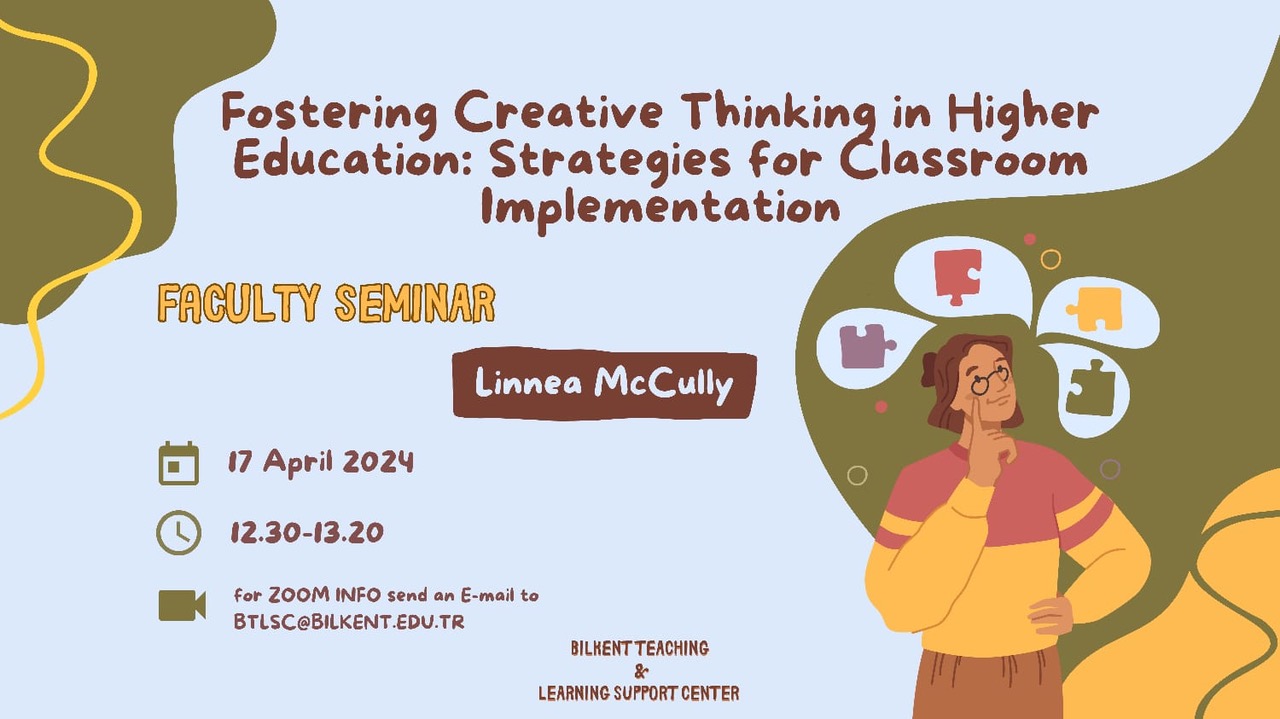
Faculty Conversation Hour: Fostering Creative Thinking in Higher Education: Strategies for Classroom Implementation
Date and Time: April 17, 12:30-13:20 via Zoom
Abstract: What role can creative thinking play in university classrooms? This seminar will delve into the importance of integrating creative thinking into classrooms. We will define creative thinking, explore its significance, and learn practical ideas for implementation. Participants will gain insights into fostering an environment conducive to innovation and originality within academic settings.
We look forward to your presence at this gathering.
Linnea McCully, originally from the United States, is an educator with sixteen years of experience. Her career has been devoted to international education, and she has fourteen years of expertise teaching the International Baccalaureate Primary Years Program. She is pursuing her MA in Curriculum and Instruction at Bilkent University, and her thesis is focused on creative divergent thinking.
Faculty Conversation Hour: Feedback strategies and promising practices
Date and Time: April 3, 12:30-13:20 via Zoom
Feedback serves as a compass in the journey of learning, providing learners with essential guidance and direction. Effective feedback offers specific information about what was done well and what areas need improvement, ultimately empowering learners to take ownership of their learning journey. Whether delivered verbally, in writing, or through other means, feedback plays a crucial role in promoting student engagement, motivation, and growth. During this hour, participants will share effective strategies used to give students feedback and to encourage them to respond to your feedback. Likewise, we can discuss challenges regarding feedback and share ideas for addressing them.
Send an e-mail to btlsc@bilkent.edu.tr for the Zoom information.
Workshop: Encouraging Student-AI Collaboration
Date and Time: 21st of March from 9:30-12:30 in G160
Participants will practice redesigning assignments to foster effective student-AI partnerships. We will work on facilitating student use of AI to enhance the learning experience and prepare learners for a future where AI is an integral part of problem-solving and innovation.
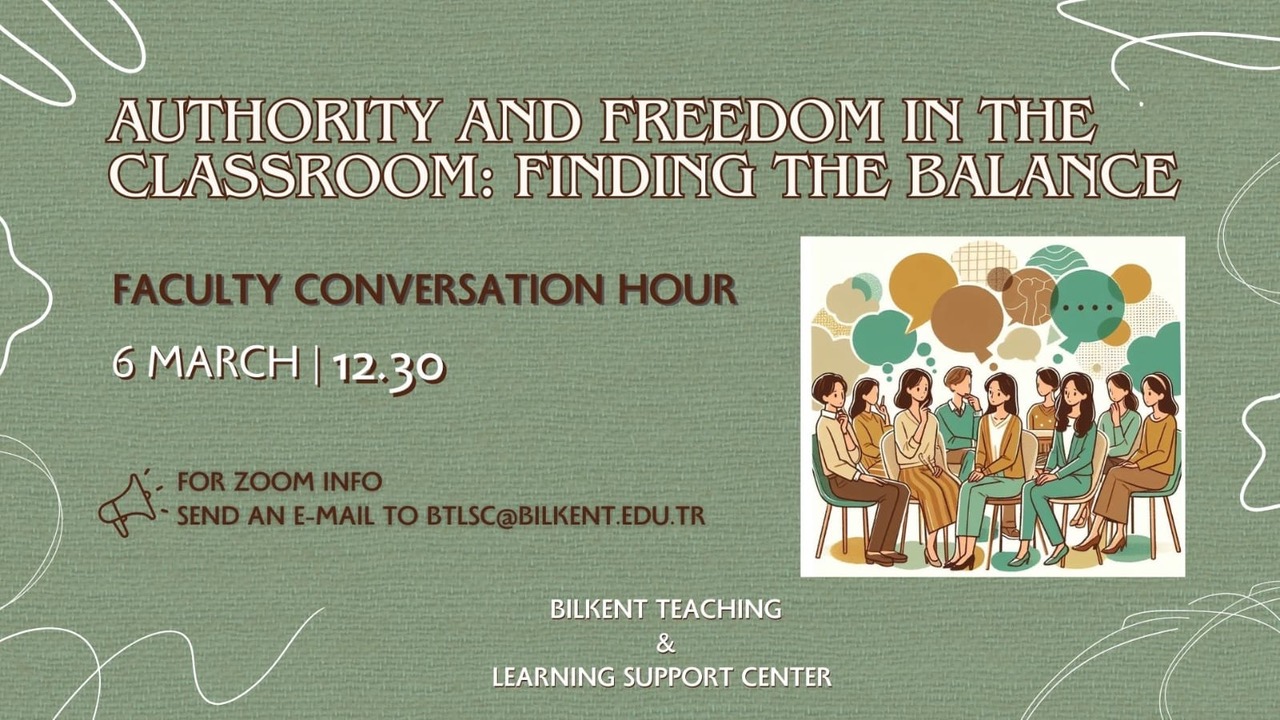 Authority and freedom in the classroom: Finding the Balance
Authority and freedom in the classroom: Finding the Balance
Date and Time: March 6,12:30-13:20 via Zoom
We will discuss some balancing issues regarding the limits of the authority of the instructor and the limits of the freedom of the students in the classroom. We will share our opinions on how to establish authority in the classroom, and to what end. We will talk about some promising practices and common mistakes.
Send an e-mail to btlsc@bilkent.edu.tr for the Zoom information.
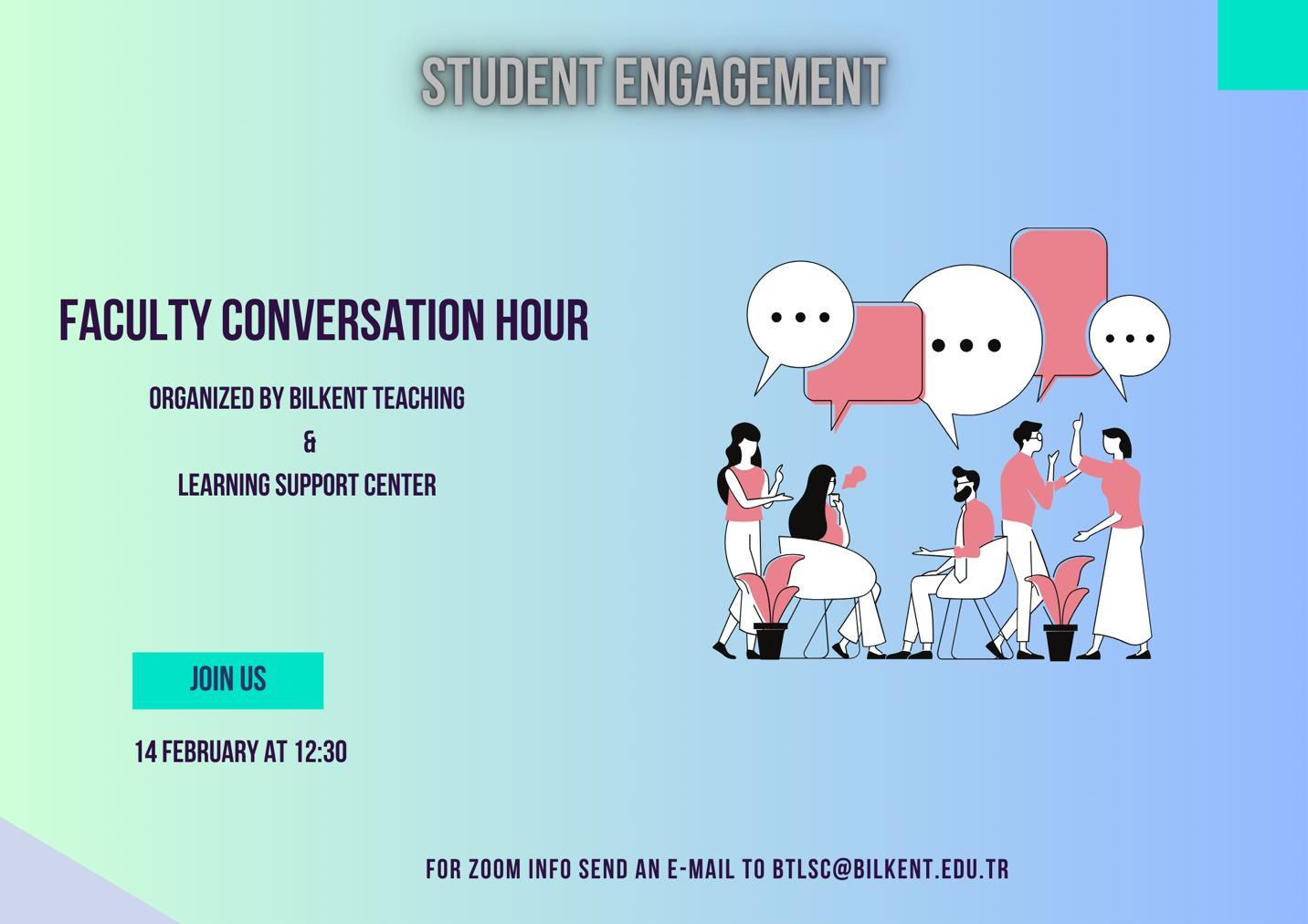 How to Actively Involve Students in their Learning
How to Actively Involve Students in their Learning
Date and Time: February 14,12:30-13:20 via Zoom
Let’s start the semester by sharing ideas and strategies to actively involve students in their learning. How do you engage students in your lessons? What challenges have you had motivating students?
Join us to share experiences and questions regarding student engagement.
For zoom information send us an e-mail: btlsc@bilkent.edu.tr
GenAI at Bilkent: Reflections on the Fall Semester
Date and Time: December 20, 12:30-13:20 via Zoom
We invite you to attend a conversation hour led by Prof Orhan Arıkan to share questions and comments about the use of GenAI in the Fall semester.
Send an e-mail to btlsc@bilkent.edu.tr for the Zoom information.
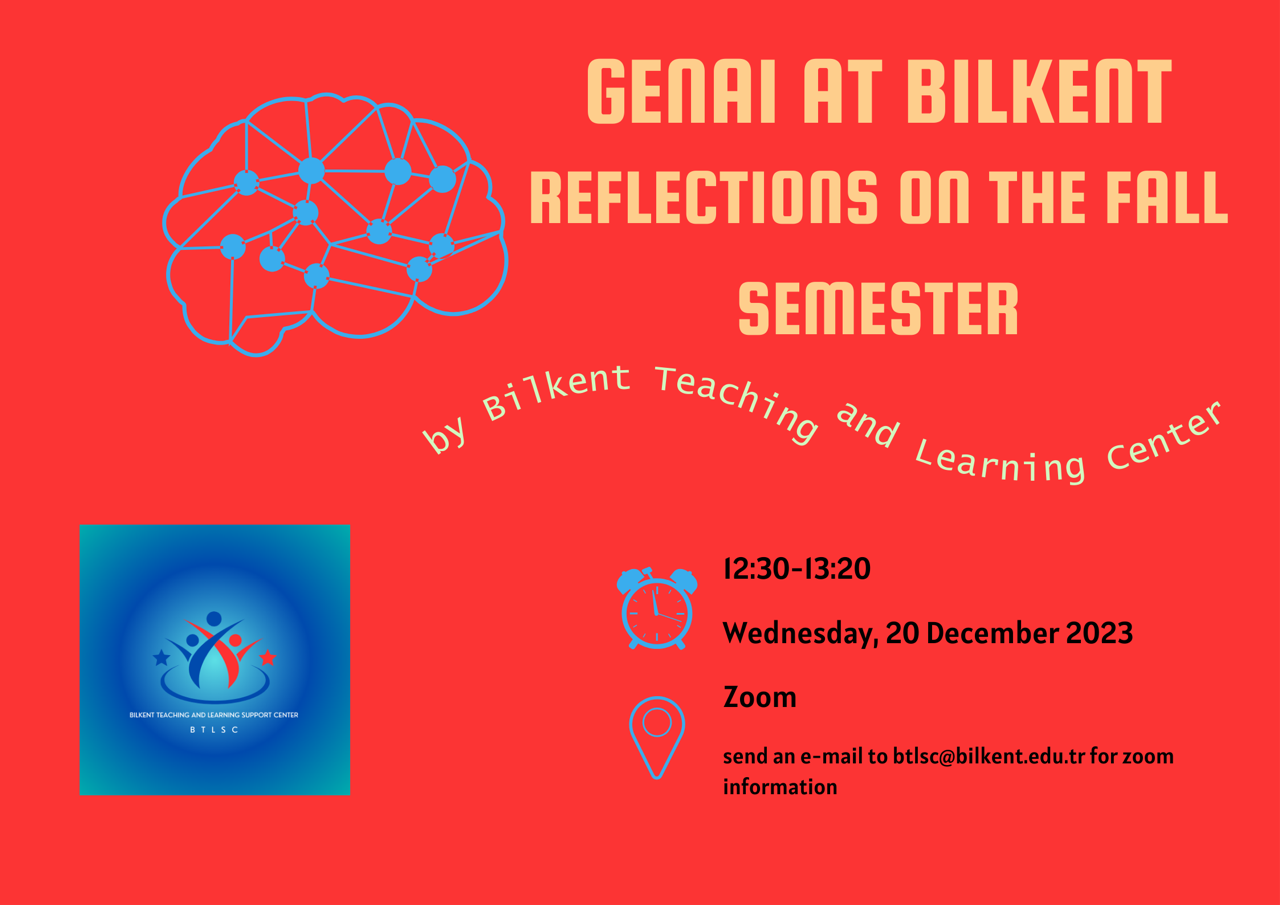
A guideline document in order to facilitate the responsible use of Generative Artificial Intelligence (GenAI) tools within the Bilkent community. This document (https://w3.bilkent.edu.tr/bilkent/generative-artificial-intelligence-genai-guideline/) outlines the definition of GenAI, provides illustrative examples, discusses potential use cases and risks associated with its use, and offers recommendations to the faculty and students for its appropriate usage. It has been prepared after reviewing the literature, conducting surveys with Bilkent students and faculty members, and organizing focus group discussions exclusively with the students. The document is also discussed in the University Senate. It will be updated regularly with the latest information and insights to match the rapidly changing technology.
BTLSC Faculty Seminar: Enhancing Critical Thinking Skills in Education
We invite you to the forthcoming “Enhancing Critical Thinking Skills in Education” seminar. The seminar is scheduled for the 29th of November at 12:30 via Zoom (https://youtu.be/CZwboY6u55w).
Speakers:
Tufan Kıymaz, Department of Philosophy & BTLSC
Elif Çalışırer Günaydın, Özel Bilkent High School
This seminar serves as a platform to look into effective methodologies, drawing from the experience in high school education.
Seminar Focus:
– Critical thinking and what it means in higher education
– Bridging educational levels: Adapting successful high school practices to higher education
Elif Çalışırer Günaydın began her academic journey by completing her B.A. degree in the Department of American Culture and Literature at Hacettepe University and pursued a non-thesis master’s degree in the Faculty of Education English Language Teaching at Hacettepe University. She took the courses Contemporary Approaches to English Language Teaching and Neurolinguistic Programming in English Language Teaching at Gazi University as a master’s student, as well. Throughout her career, she has had various teaching and administrative roles, contributing to developing curriculum design, delivery, and pedagogical practices. She is currently working as the International Baccalaureate Diploma Programme (IB DP) Coordinator at I.D.F. Bilkent High School. She teaches IB DP Theory of Knowledge (TOK) and English A Language and Literature, Middle Years Programme(MYP) English Language and Literature courses. She edited and wrote an article named ” A Model for Effective EAP Outcomes: The International Baccalaureate Diploma Experience” with a focus on providing insights into the performance of IB DP students as well as how the academic skills ensure students successfully meet faculty needs across disciplines, particularly in Turkish English Medium Universities, analyzing the design features of the IBDP, based on practical teaching experience, that might gainfully be applied to university EAP Programmes to bolster EAP outcomes.
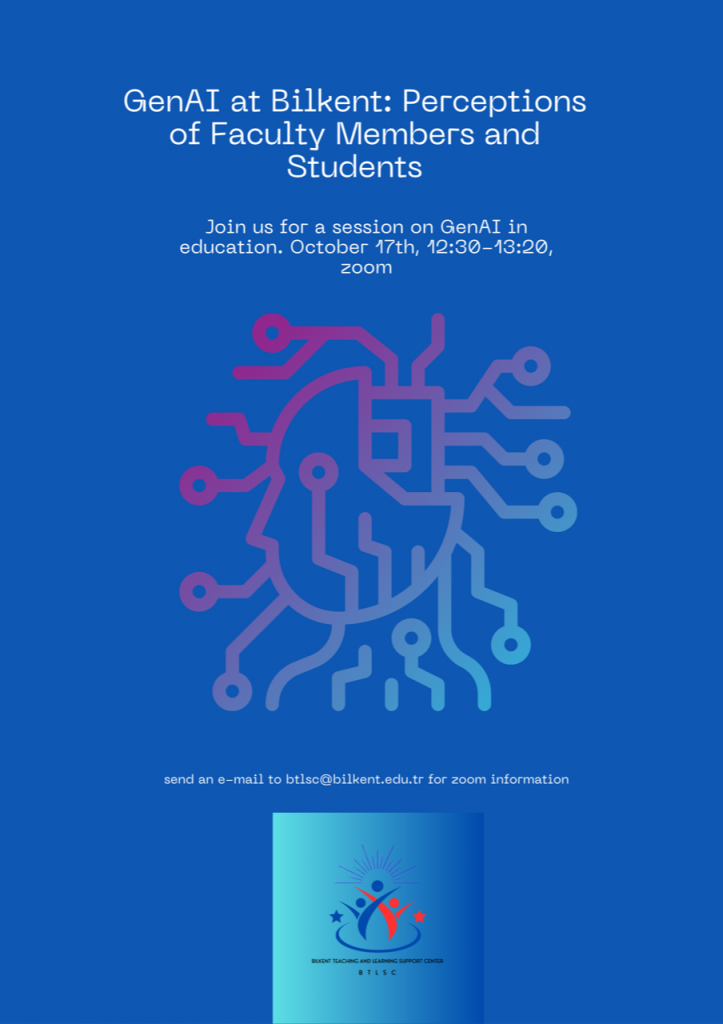 Join us for a session on GenAI in education.
Join us for a session on GenAI in education.
“GenAI at Bilkent: Perceptions of faculty Members and Student”
October 17th, 12:30 – 13:20, Zoom
(Please ask for the password: btlsc@bilkent.edu.tr)
A guideline document in order to facilitate the responsible use of Generative Artificial Intelligence (GenAI) tools within the Bilkent community. This document (https://w3.bilkent.edu.tr/bilkent/generative-artificial-intelligence-genai-guideline/) outlines the definition of GenAI, provides illustrative examples, discusses potential use cases and risks associated with its use, and offers recommendations to the faculty and students for its appropriate usage. It has been prepared after reviewing the literature, conducting surveys with Bilkent students and faculty members, and organizing focus group discussions exclusively with the students. The document is also discussed in the University Senate. It will be updated regularly with the latest information and insights to match the rapidly changing technology.
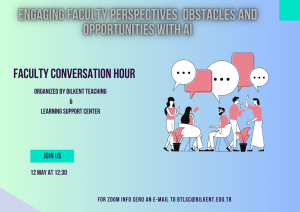
Faculty Conversation Hour:“Engaging Faculty Perspectives: Obstacles and Opportunities with Artificial Intelligence”
Friday, May 12, 2023 12:30 – 1:20 pm
(Please ask for the password: btlsc@bilkent.edu.tr)
Join our faculty conversation hour as we delve into the obstacles and opportunities presented by AI from a faculty perspective. This interactive session will bring together faculty members to share their experiences, challenges, and insights in implementing AI technologies, explore the limitations and biases, and discuss the potential of it in academic settings.
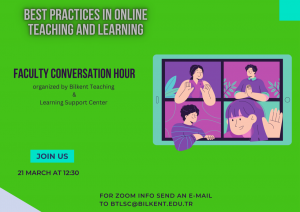 Faculty Conversation Hour: “Best practices in online teaching and learning”
Faculty Conversation Hour: “Best practices in online teaching and learning”
Tuesday, March 21, 2022 12:30 – 1:20 pm
(Please ask for the password: btlsc@bilkent.edu.tr)
Join us for a discussion on best practice in online teaching and learning. Participants will be invited to share their experiences, and collectively brainstorm strategies and methods for addressing what makes it best practice or what is best in online teaching.
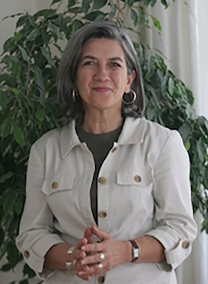 Travmatik Yaşantılarda Psikolojik İlk Yardım: Soru-Cevap Oturumu
Travmatik Yaşantılarda Psikolojik İlk Yardım: Soru-Cevap Oturumu
Friday, February 17, 2023, 3:00-4:00pm
Please see seminar’s video via the YouTube link.
Ülkece içinden geçtiğimiz bu zor günlerde, bir araya gelerek neler hissettiğimizi, birbirimize ve öğrencilerimize nasıl destek olabileceğimizi konuşacağımız Travmatik Yaşantılarda Psikolojik İlk Yardım konulu Bilkent Öğretim ve Öğrenim Destek Merkezinin Klinik Psikolog, Dr. Nedret Öztan’ın destekleriyle düzenleyeceği online Soru- Cevap oturumuna sizleri davet ediyoruz.
About Dr. Nedret Öztan
Dr. Nedret Öztan 1999 Kocaeli Depreminden sonra 3 yıl deprem bölgesinde, daha sonraki 2 yılda 25 ilde okullardaki psikososyal destek sistemini geliştirmek üzere MEB ve UNICEF koordinasyonunda çalışmıştır. Daha sonra da Bingöl Depremi (2003), Elazığ Depremi (2010), Van Depremi (2011) ve Bodrum Depreminde (2017) psikososyal çalışmaları yönetmiştir. Ayrıca İran depremi (2004) ve Pakistan depreminden (2005) sonra o ülkelerde, UNICEF and IFRC ile birlikte psikosoyal destek çalışmalarını yürütüp el kitaplarını hazırlamıştır. Deprem çalışmalarının yanısıra Mardin Katliamı (2009) ve Zonguldak (2010), Soma (2014) ve Ermenek (2014) maden kazalarından sonra, Reyhanlı Bombalamasında (2013) ve Kilis füze düşmeleri (2016) sonrasındaki psikososyal destek çalışmalarını yürütmüştür.
 “Psychological First Aid in Traumatic Experiences”
“Psychological First Aid in Traumatic Experiences”
February 15, 2023 1:00 – 2:00 pm
Place: Online Zoom Meeting
Please see seminar’s video via the YouTube link.
In this seminar, the social and psychological effects of traumatic experiences and emergency situations we may experience in our lives will be reviewed. These effects and reactions are considered normal reactions to abnormal events. The approach to deal with these effects, whether we experience ourselves or we observe in other people’ will be reviewed and discussed.
Note: This event is organized in cooperation with Bilkent University Teaching and Learning Support Center (Bilkent University), Center for Advancing Learning and Teaching (Middle East Technical University), Center for Teaching and Learning (TED University), Office of Learning and Teaching (Koç University), & Sustainable Teaching and Learning Center (Hacettepe University),
About Dr. Nedret Öztan
Dr. Nedret Öztan has worked in the field after 1999 Earthquake with the affected population in Kocaeli area for 3 years and another 2 years in 25 cities to implement the psychosocial programs in school system in coordination with the Ministry of Education and UNICEF. She has worked in the field in the planning and implementing psychosocial interventions after Bingöl Earthquake (2003), Elazig Earthquake (2010), Van Earthquake (2011) and Bodrum earthquake (2017). She has also worked in the field After Iran Earthquake (2004) and Pakistan Earthquake( 2005) with UNICEF and IFRC, planning psychosocial interventions and writing handbooks. She was also involved in planning and application of psychosocial interventions after Mardin Massacre (2009) and the mine accidents Zonguldak (2010), Soma(2014) and Ermenek (2014), as well as Reyhanli Bombing (2013) and Kilis (2016) missile attacks.
